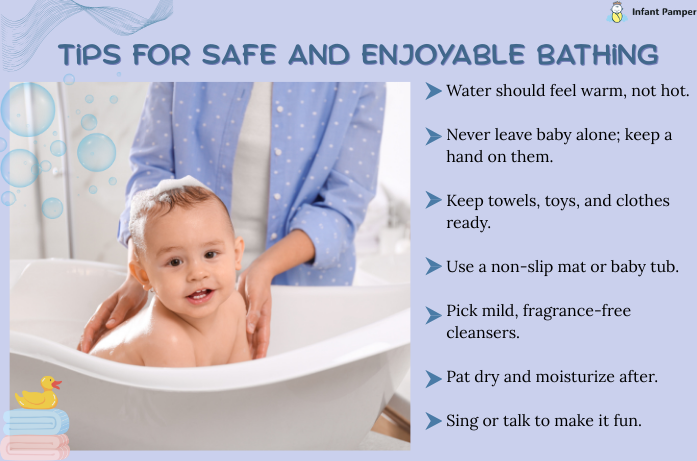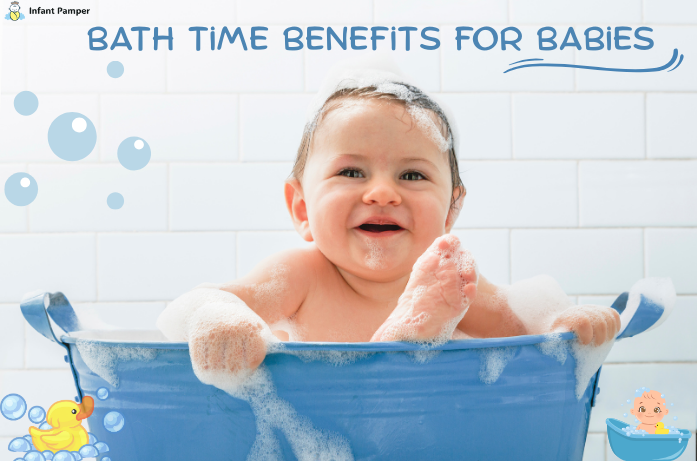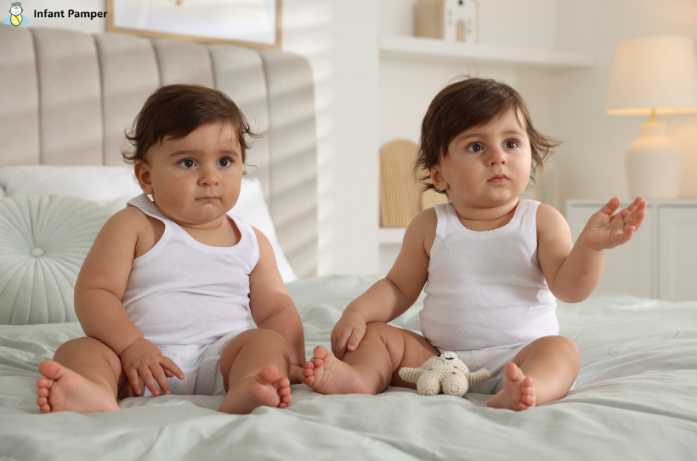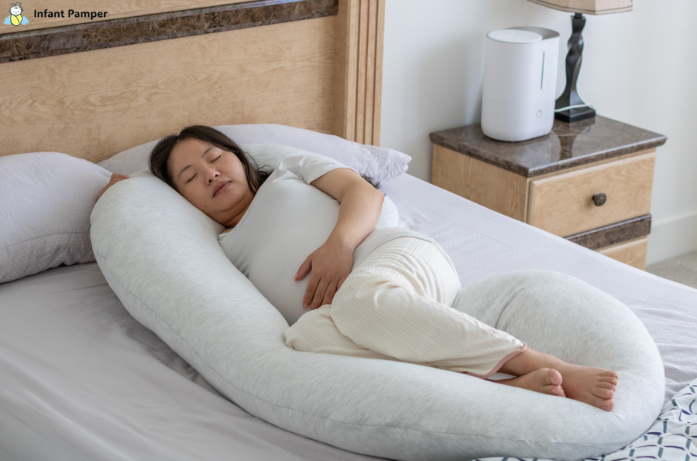Parenting comes with countless questions, and one of the biggest ones is bath time. How often should you bathe your baby? What kinds of soaps are safe? Is bathing every day really good for them? Or should it be avoided?
Every baby is a unique world; however, bath time is not just about cleaning up messes. It is a bonding, relaxing, learning process and a real stimulus for the baby’s brain development. If done correctly, daily bathing can become a bond between parent and baby that nurtures the baby’s development.
Now, let’s discuss the positive points of a baby bath, keeping it safe and fun, along with what pediatricians should recommend.
Physical Benefits: Clean Skin and Healthy Skin
Bathing keeps babies fresh and healthy, but delicate skin needs gentle care.
1. Removes Dirt and Germs, Promotes Healthy Skin
Babies get messy with drool, spills, or leaks from the diaper. So, bath-time washes off dirt and germs that may harm their skin.
According to expert advice from AAP and Mayo Clinic, a newborn should be given only 2–3 baths a week since frequent use of soap tends to dry out their skin. More frequent showers may be required for older babies who crawl and eat solids. Helpful bathing guidance is also available from Nationwide Children’s Hospital.
Parent tip: Keep it to quick warm-water baths during the day, with soap use limited to a few times a week.
2. Soothes Sensitive Skin
Warm water is great comfort for little ones with mild rashes or eczema. Use gentle, fragrance-free cleansers, and avoid using harsh soaps or bubble baths. Finish the bathing routine with a moisturizing treatment to soften the skin.
Parent tip: If skin problems persist, ask your pediatrician about the best bath routine and cleanser. You can also review expert newborn skincare advice from Children’s Hospital of Philadelphia.
Emotional & Developmental Benefits
Bathing goes beyond hygiene, serving as a wonderful moment of bonding and learning.
1. Parent–Baby Relationship Building
Bathing is an occasion for physical contact, eye contact, and play, all of which build trust and closeness. For many parents, it is one of the relaxing and joyful moments of the day.
2. Supports Brain Development & Sensory Play
He has a bath, stimulating touch, sight, sound, and smell to help babies explore and build brain connections. Research also shows that bath time can be a powerful moment for sensory bonding and development (Nurture Science Program).
Parent tip: Use simple bath toys, soft cloths, or songs to make it playful and educational.
3. Reduces Fussiness and Aids Sleep
A warm bath will usually calm down a baby and prepare her for sleep. When the bathing session forms part of a bedtime routine – massage, putting on pajamas, lullaby singing – it starts setting sleep cues.
Building Healthy Routines Through Bath Time
Routine makes babies feel secure; bathing can be a perfect theme to incorporate into their daily lives.
1. Establishes Predictable Habits
An evening bath tells the baby that it is time to wind down to instill a sense of calm and security.
2. Teaches Early Hygiene Concepts
Being washed from time to time tells the baby that being clean is the norm; this becomes the stepping stone toward habits like handwashing later on.
3. Encourages Motor Skill Development
In a bathtub, splashing around, reaching for toys, and gripping all help develop coordination and motor skills.
Parent tip: Offer just a few basic safe toys – too many can lead to distraction instead of learning.

Tips for Safe and Enjoyable Bathing
Make bath time fun but safe! Here are some reliable guidelines (based on recommendations from the American Academy of Dermatology and the UK National Health Service (NHS):
- Check the water temperature. Use the wrist or elbow; it should feel warm, not hot! The optimal temperature would be 37–38°C (98–100°F).
- Never leave the baby to be away even for a few seconds. At least one hand should always be on the baby.
- Prepare yourself before you start; towels, cleanser, toys, and fresh clothes should all be within an arm’s reach.
- Use rubber mats for the sink or baby tubs to prevent sliding and provide secure footing during baths.
- Use mild cleansers and preferably those that are fragrance-free and baby-safe.
- Apply moisturizer afterward; pat dry and use baby lotion to protect against dryness.
- Make it fun. Sing, talk, or narrate what you’re doing, your voice soothes your baby and helps with language development.
How Often Is Best? (Breaking Down by Age)
People and babies do not have to follow the same bathing schedule. Here’s a simple guide:
Newborns (0–6 months):
- Only 2–3 baths per week are needed.
- Between baths, it is good to practice “top and tail” clean-up (face, hands, diaper area).
Older infants (6–12 months):
- Bathing increases when babies are crawling, eating solids, and getting messier.
- Daily baths are okay if the skin is not too dry.
Toddlers (12+ months):
- Usually by this age, a daily bath is a regular routine for after going outdoors.
Babies with eczema/sensitive skin:
- Follow your pediatrician. Some might recommend daily quick baths together with moisturizing, while others might ask you to keep them farther apart.
Final Thoughts
Bathing is more than just a chore; it is a daily opportunity to express love, learn together, and establish a connection. Approached with care, it heals dry skin and builds covers fostering hygiene; it strengthens emotional ties; it helps brain and motor development; it lays down predictable routines on which babies thrive.
Every parent will have a unique journey, and each baby is different too. Whether daily baths or a few times a week is your method, what is most important is that bath time remains gentle, fun, and safe. Finding the balance will ensure you are nurturing your little one even in the process of cleaning them.
FAQs About Baby Bath Time
1. Do newborns need a bath every day?
No. Bath for the newborn happens twice or thrice a week. Too much bathing will dry their skin.
2. What would be the best time of day to bathe the baby?
Evening baths are quite famous because they allow the baby to relax before going to bed. But any peaceful time can do, provided no rush is there.
3. Can I use soap for every bath?
No need to. Use just mild, fragrance-free soap two to three times a week. Just warm water will do for the rest of the days.
4. What to do if my baby cries during the bath?
Make sure the temperature of the water is right; make the bath shorter or make bath time fun-warm-up with some songs, gentle talking. Some babies just need some time to get used to it.
5. How long should a baby bath last?
In general, baths have to be quick, for 5-10 minutes for the newborn, infant.
👉 To be more confident in your parenting journey, you can check the Infant Pamper blog with trusted, heartwarming guides on baby care and family routines.




